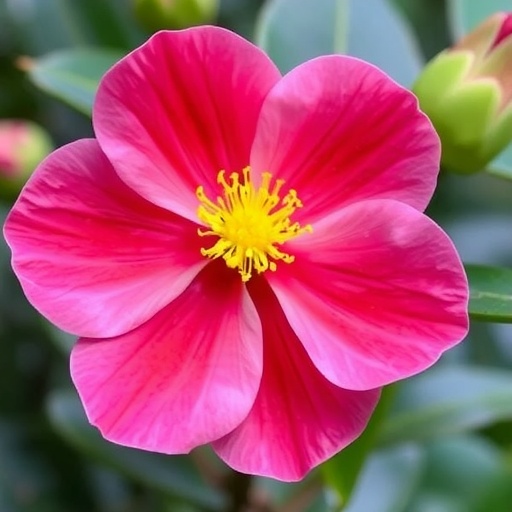Researchers have made significant strides in the understanding of the interaction between exophytic microorganisms and pollen behavior, particularly focusing on the ancient tea plant, Camellia sinensis. This research, led by Toksoz, Cetinbas-Genc, and Berber, delves into the cellular and molecular consequences that these microorganisms bestow upon in vitro pollen germination and subsequent pollen tube growth. The study’s findings illuminate the complexities of plant-microbe interactions and their potential implications in agricultural practices and ecological systems.
Microorganisms that reside on the surface of plants, known as exophytic microorganisms, play a critical role in various plant physiological processes. These organisms form part of the plant’s microbiome, which has been gaining attention for its influence on plant health, growth, and resilience. In the case of Camellia sinensis, a keystone species in global tea production, understanding the relationship between pollen and these microorganisms is essential for both ecological research and agricultural advancements.
In their exploration, the researchers specifically examined how the presence of exophytic microorganisms influences the viability of pollen grains during germination. It has been established that pollen viability directly impacts fertilization success and, consequently, seed and fruit development. Previous studies have indicated that environmental factors, such as humidity and temperature, significantly affect pollen viability, suggesting that microorganisms could also play an essential regulatory role in these processes.
The experimental design implemented in this study was carefully structured to assess pollen germination rates and tube growth under controlled laboratory conditions. Freshly collected pollen grains from Camellia sinensis were exposed to various strains of exophytic microorganisms. The investigation’s approach included measuring germination rates and pollen tube lengths, which are critical markers of successful fertilization processes.
As background to this investigation, the researchers outlined the importance of utilizing in vitro systems to manage variables that could skew results in natural environments. This controlled approach allowed for a clearer understanding of the microorganisms’ impacts on pollen, eliminating external influences that are difficult to measure in the wild.
Results from the study revealed a nuanced relationship between the interaction of exophytic microorganisms and pollen behavior. It was observed that certain strains of microorganisms enhanced germination rates, while others had detrimental impacts. The variability in these outcomes underscores the complex nature of microbial interactions and indicates that not all microorganisms exert beneficial effects on pollen function.
Additionally, the researchers documented significant differences in pollen tube growth when exposed to various exophytic microbial communities. The presence of specific beneficial microbes altered the biochemical environment surrounding the pollen, enhancing its capabilities to germinate and extend tubes toward the ovule. This finding further emphasizes the idea that beneficial microorganisms are not merely passive passengers on plant surfaces but are active participants in the reproductive success of flowering plants.
The implications of this study extend beyond just the tea plant. With a growing emphasis on sustainable agriculture and organic farming practices, understanding these interactions could lead to innovative approaches in crop management. The research highlights the potential for harnessing beneficial microorganisms to enhance pollination and improve crop yields, thereby contributing to food security.
Moreover, the exploration of exophytic microorganisms can open new avenues for research into plant-microbe symbiosis. By understanding how these microorganisms affect key reproductive processes, scientists could develop strategies to optimize plant health and longevity, crucial factors in combating challenges posed by climate change and agricultural pressures.
The researchers acknowledge that their findings also hint at broader ecological dynamics. As biodiversity loss presents serious global challenges, these interactions suggest pathways for the restabilization of ecosystems through microbial diversity. By fostering healthy microbial communities, we could enhance the resilience of plant species in changing environments.
In conclusion, the ongoing exploration of the relationship between exophytic microorganisms and pollen germination presents exciting opportunities for both theoretical and applied ecology. The team of Toksoz, Cetinbas-Genc, and Berber has set a precedent for future studies that could further unravel the complexities of these interactions. Their work not only advances our understanding of plant biology but also has practical implications that could revolutionize agricultural practices globally.
This study stands as a significant contribution to the field of plant sciences, demonstrating the potential that exists at the intersection of microbiology and botany. As we continue to explore these intricate connections, it becomes increasingly evident that microorganisms are invaluable allies in the quest for sustainable agricultural practices and ecological preservation.
Subject of Research: The effect of exophytic microorganisms on pollen germination and pollen tube growth in Camellia sinensis.
Article Title: Do exophytic microorganisms affect in vitro pollen germination and pollen tube growth in Camellia sinensis?
Article References: Toksoz, O., Cetinbas-Genc, A., Berber, D. et al. Do exophytic microorganisms affect in vitro pollen germination and pollen tube growth in Camellia sinensis?. Sci Nat 112, 58 (2025). https://doi.org/10.1007/s00114-025-02014-x
Image Credits: AI Generated
DOI: https://doi.org/10.1007/s00114-025-02014-x
Keywords: exophytic microorganisms, pollen germination, Camellia sinensis, plant-microbe interactions, sustainable agriculture.




